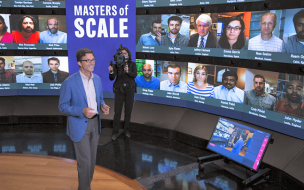An explosion of free or subsidised online content is helping to bring business education to emergent countries, potentially opening up careers for millions.
Technological advances and a shifting workforce are changing the nature of education. The online learning revolution has opened up study and potential careers for millions.
An explosion of free or subsidised online content is helping to bring education to emergent countries.
The United Nation’s Broadband Commission forecasts that 50% of the global population will be online by 2017, and demand for digital courses is spreading into west Africa, India, China and the Arab world.
“One of the biggest transformations in education came about as a result of the ubiquity of [the] internet in our lives,” says Sanjay Sarma, director of online learning at the Massachusetts Institute of Technology.
Business schools have adopted the online delivery method, with a host of their programs being flipped online and Moocs being launched.
Many of these courses are populated in part by educated and employed users seeking part-time study, but providers have sought to expand learning and bring educational to all.
The web has enabled underrepresented groups around the world such as women, youth, the disabled and citizens in rural communities to gain quality education.
“Connectivity is not a luxury for the rich – rather, it is the most powerful tool mankind has ever had at its disposal to bridge development gaps in areas like health, education, environmental management and gender empowerment,” says Dr Hamadoun Touré, secretary-general of the International Telecommunication Union, the UN’s agency for ICT.
According to UN estimates there were 77 countries in 2014 where over 50% of the population was online, up from 70 in 2013.
This connectivity has enabled learning technology providers to roll out courses to the masses.
EdX and Saudi Arabia’s Ministry of Labor run an open-platform Mooc portal designed to bridge the gap between education and employment in the oil-rich Gulf state.
The University of the People, a non-profit internet university, provides education online for refugees, and in collaboration with Microsoft offers scholarships for African youths that see them mentored by Microsoft employees.
The group, partnered with top US universities including Yale University and New York University, will also grant 1,000 high school graduates in South Africa spots on its online degrees.
Youth unemployment is a particular problem across the African continent with the figure rising to 25% in South Africa in 2014, according to a labour force survey conducted by Statistics South Africa, the country’s official statistics service.
“The right to a quality education mustn’t be a matter of one’s geographical or financial situation; access to education must be an equal and basic right for all, rather than a privilege for the few,” says UoPeople president Shai Reshef.
Guokr Mooc Academy has opened up learning to thousands in China, providing an access route to foreign education for lower income students. Founded after an injection of funding by TBP, a venture capital fund in Shanghai, it has grown to have more than 2,000 courses online.
Like many distance learning providers, Coursera has also sought to expand into new markets. The number of Chinese students on its digital platform has quadrupled in a year.
EdX has rapidly expanded its Asian base, signing on 15 new university partners in 2013 including Seoul National University in South Korea and Tsinghua University in China.
Expansion has given providers massive enrolments. In 2014, EdX had at least 2.7 million users; Udacity 1.6 million; Alison 3 million; and Coursera had amassed 10 million users.
“We are moving forward with our mission to reimagine education,” says Anant Agarwal, president of edX.
It is key for these groups to provide content for the masses but business contracts too have been an area of growth.
Learning technology groups are powering business education outside of the classroom.
The web has given rise to a plethora of benefits for companies, as they invest in management and technical training for employees. Distance learning is helping firms to grow.
Udemy provides online content for Oracle Corporation, the computer tech company. Coursera has announced new partnerships with Mastercard, AT&T and Shell.
Bank of New York Mellon is poised to roll out a series of digital learning finance courses to educate some of its 51,000 global employees on capital flows and liquidity.
“There’s a huge opportunity to adapt online education and take it beyond its academic roots to help learners and employers close the skills gap,” says Daphne Koller, president of Coursera.
The company and rivals like edX and FutureLearn are experts in providing free courses known as Moocs, but full-service online universities have cropped up and are gaining accreditation from educational bodies.
Students who would once look to bricks and mortar universities and business school degrees like MBAs are migrating to the cyberworld.
A recent survey by UK-based education marketing consultancy CarringtonCrisp found that three-quarters of prospective business school students would prefer to shape study around their lifestyles or work.
EdX and Coursera offer management-related courses online, charging for entry, or for certificates. UoPeople and 2U offer full business management degrees taught entirely online.
UoPeople in particular has managed to combat online programs’ biggest problem: drop outs.
According to a study by the University of Pennsylvania, of one million people who signed up for a Coursera course from June 2012 to June 2013, only 4% completed their classes.
Now, employment prospects are increasingly the priority. Mooc platforms that offer paid-for certificates encourage students to post them on networking sites such as LinkedIn.
“We’re planning to create a gallery of the projects that students complete as part of their coursework,” says Daphne at Coursera. "This will give students a way to present their work."
This plays into the make-up of Mooc cohorts. University of Pennsylvania researchers estimate that of 34,779 students taking Coursera courses, more than 80% had a two or four year degree, and 44% had some postgraduate education.
Yet not all companies see the value, particularly when fishing for graduates of business school programs.
According to a report by AMBA, the business education accrediting body, recruiters still “do not consider job seekers from online business programs to be of the same calibre as those that have graduated from a face-to-face” programs.
There are further concerns that online degrees and Moocs represent a threat to traditional degrees, but heads of leading academic institutions increasingly deploy them as marketing tools, rather than fearing a potential loss of students.
“Many schools have been using them to create a complementary, well-rounded educational experience,” says Bernard Garrette, associate dean of the MBA at HEC Paris, a leading French business school.
But ultimately, online education has opened up the world to new opportunity, and this phenomenon will continue to gain ground as providers secure investment and new partnerships.
For some providers there is also increasingly a business opportunity. In 2014, 2U listed on the Nasdaq with a market cap of $700 million. Others would seem to agree – this month its shares were up as much as 7% on its debut.
Student Reviews
Cultural experience
I have met the most competent and diverse batch in this school. These people not only thrive on their own but also makes sure that you are doing it with them. The professors will take your had and walk you through all milestones and make sure you are not left behind. I have found their extracurriculars extremely engaging. There was always a room to have social life after academic life. The only hindrance is the location of the school, it is slightly outside city and living in city is expensive.
Internationality and diversity of opportunities
About my programme I would say it is very international and flexible: we have the opportunity to choose exactly the courses we want. But at the same time, the frame of the campus is crucial in students' life and enable us to create friendships.
Great selection of people
While HEC's MBA is highly selective, I really enjoy the type of people HEC's selects to make sure everybody gets the best out of their MBA experience and networking opportunities. Not only it's an incredibly diverse pool of people (~60 nationalities) but most importantly they make sure to let in friendly empathic and curious people.
Best in France for Grande ecole
A prestigious business school. Languages are important. It is better to have a scientific baccalaureate with excellent grades in high school and good assessments.
The courses are well designed as per the latest trends and practicality of learning in stressed upon. Overall, a very good experience.
Diversity and quality of fellow students
Very international and interesting place to be and opens a lot of opportunities, however the administration is very french and facilities are subpar (gym, classrooms) meaning the academic affairs is pretty much useless and lastly we are graded on a curve which can create a toxic environment because of the competition. With that being said the pros outweighs the cons by far.
The quality of the teachers, the campus, the clubs
The school is very international indeed, we have courses with international students and share things with them within the extra academic life (in the social clubs especially). We have great career prospects if we prepare ourselves well - however, the global curriculum is still very finance-oriented, which is a pity for other interesting domains of the company world, which does not rely on finance only. The social clubs are good practice for the management and for now, are quite independent.
HEC Paris awaits you
HEC Paris is really a nice place to do a master's in business. Many classes are useful and interesting (corporate finance, financial accounting, contract law…), some are less - but the curriculum is to be reviewed in the year to come. Regarding the student life, it is incredible, with about 130 clubs, lots of great parties with even greater people. The Jouy campus offers a lot of opportunities to do sports, and you can breathe fresh air every day. HEC also helps a great deal to find an internship or a job.
A dream institute
Enrolling in the HEC MBA was by far the best decision I made for myself. The people and faculty are great, with lots of opportunities to meet people and expand your horizons. Very nice campus where I have had some good running sessions.
The alumni network is superb and very helpful. It also has a good support system for entrepreneurs. Would definitely recommend it!
Good choice for a career boost
The classes were extremely practical and relevant to the current challenges that businesses are facing. You have access to a wide range of professionals and good career prospects once you leave the university.
Cultural experience
I have met the most competent and diverse batch in this school. These people not only thrive on their own but also makes sure that you are doing it with them. The professors will take your had and walk you through all milestones and make sure you are not left behind. I have found their extracurriculars extremely engaging. There was always a room to have social life after academic life. The only hindrance is the location of the school, it is slightly outside city and living in city is expensive.
Internationality and diversity of opportunities
About my programme I would say it is very international and flexible: we have the opportunity to choose exactly the courses we want. But at the same time, the frame of the campus is crucial in students' life and enable us to create friendships.
Great selection of people
While HEC's MBA is highly selective, I really enjoy the type of people HEC's selects to make sure everybody gets the best out of their MBA experience and networking opportunities. Not only it's an incredibly diverse pool of people (~60 nationalities) but most importantly they make sure to let in friendly empathic and curious people.
Best in France for Grande ecole
A prestigious business school. Languages are important. It is better to have a scientific baccalaureate with excellent grades in high school and good assessments.
The courses are well designed as per the latest trends and practicality of learning in stressed upon. Overall, a very good experience.
Diversity and quality of fellow students
Very international and interesting place to be and opens a lot of opportunities, however the administration is very french and facilities are subpar (gym, classrooms) meaning the academic affairs is pretty much useless and lastly we are graded on a curve which can create a toxic environment because of the competition. With that being said the pros outweighs the cons by far.
The quality of the teachers, the campus, the clubs
The school is very international indeed, we have courses with international students and share things with them within the extra academic life (in the social clubs especially). We have great career prospects if we prepare ourselves well - however, the global curriculum is still very finance-oriented, which is a pity for other interesting domains of the company world, which does not rely on finance only. The social clubs are good practice for the management and for now, are quite independent.
HEC Paris awaits you
HEC Paris is really a nice place to do a master's in business. Many classes are useful and interesting (corporate finance, financial accounting, contract law…), some are less - but the curriculum is to be reviewed in the year to come. Regarding the student life, it is incredible, with about 130 clubs, lots of great parties with even greater people. The Jouy campus offers a lot of opportunities to do sports, and you can breathe fresh air every day. HEC also helps a great deal to find an internship or a job.
A dream institute
Enrolling in the HEC MBA was by far the best decision I made for myself. The people and faculty are great, with lots of opportunities to meet people and expand your horizons. Very nice campus where I have had some good running sessions.
The alumni network is superb and very helpful. It also has a good support system for entrepreneurs. Would definitely recommend it!
Good choice for a career boost
The classes were extremely practical and relevant to the current challenges that businesses are facing. You have access to a wide range of professionals and good career prospects once you leave the university.
Diverse
HEC, as an academic institution, serves as a launching pad for students to excel in their pursuits and careers. The diversity among students and professors is truly remarkable. The chance to attend seminars across five major continents is unparalleled. The exposure and relationships it fosters are invaluable.
Super diverse
It's a super diverse and fascinating environment with tons of chances, but the management is very French, and the facilities like the gym and classrooms are not great. This makes the academic side quite ineffective. Plus, we're graded on a curve, leading to a competitive and sometimes toxic atmosphere. Despite all that, the benefits definitely overshadow the drawbacks.
Surreal academic experience
What stood out to me about HEC was the direction and insight it offered on coding approaches. Prior to joining the program, I attempted self-learning, but I felt disoriented and lacked a starting point.HEC enabled me to grasp the basics of programming and provided support when I encountered obstacles. Without that guidance, I doubt I would have achieved the progress I have made to date.
Good security
HEC boasts a dedicated team of security personnel who undergo rigorous training to ensure the perpetual maintenance of tranquility and orderliness within the institution. Their unwavering efforts are directed towards fostering a sense of security among the student body, thereby enabling them to channel their energies predominantly towards their academic pursuits.
Innovative teaching method
I am thoroughly enjoying my time at HEC, from the innovative teaching methods to the welcoming campus environment, which is particularly supportive of international students. The extracurricular opportunities, such as sports and associations, are incredibly valuable. Additionally, the career services offered are exceptional. Overall, I find my experience at HEC to be truly enriching.
mim
HEC Paris has been a transformative experience for me. The caliber of the faculty, the diversity of the student body, and the global network it offers are unmatched. The curriculum is highly flexible, allowing students to tailor their learning experience to their career goals, and the focus on real-world application through case studies and consulting projects provides invaluable hands-on experience. The campus itself is beautiful, and the opportunities to engage with leading companies through internships, competitions, and networking events have been incredible. HEC truly prepares you to be a leader in today's complex business world. I couldn’t have asked for a better program to propel my career forward.
Unwavering enthusiasm
Here's the first paragraph:
I embarked on a journey to Paris, where HEC University welcomed me with open arms. As I stepped onto its prestigious campus, I was captivated by the infectious energy and innovative spirit that filled the air. The passionate faculty, industry experts, and fellow visionaries from around the globe shared their knowledge with unwavering enthusiasm."
Exceptional Experience
HEC offers an exceptional experience that I highly recommend. The small-town setting allows for a unique blend of academic rigor and community engagement. The peaceful campus and close-knit student body create a warm environment. Proactive engagement with professors yields valuable guidance. Friendships may blossom slowly, but persistence pays off. The city's beauty, scenic views, and diverse eateries near campus enrich the experience. University dining may not impress, but it's decent.
A Transformative Experience
Attending HEC Paris is an exceptional experience, combining world-class education with personal and professional growth opportunities.
The courses are incredibly engaging, delivered by highly qualified professionals who are specialists in their domains and often work or have work experience in prestigious companies. Far from being purely theoretical, the programs emphasise practical, hands-on learning, allowing students to dive deep into whichever area they want to specialise in. The variety of elective courses is remarkable - you can explore anything from advanced financial techniques to more cultural disciplines like politics, arts, and cinema.
Beyond academics, the student life at HEC is vibrant and dynamic. With over 50 student associations to join, there's something that will fit for everyone. Whether you are passionate about entrepreneurship, sports, arts, cuisine, social causes or anything else, HEC offers a space to explore and develop your interests.
The campus itself is well-equipped, providing students with everything they need for a comfortable and enriching experience. From excellent accommodations and sports facilities with professional coaching to a sprawling green area perfect for walking or relaxing, the environment is both stimulating and tranquil. And with Paris just a short bus ride away, students have the added benefit of easy access to one of the world's most beautiful cities.
However, what truly sets HEC apart is the unparalleled networking opportunities it provides. The school fosters connections through daily conferences in various fields of business (and not only business), networking events, site visits, and alumni cocktails. The alumni network is incredibly powerful, opening doors to countless opportunities and making it easier to connect with professionals in your dream field. The career center is another standout feature, offering invaluable support to help students navigate their career paths.
In conclusion, HEC Paris is much more than a top-tier European business school - it’s a transformative experience that equips you with the knowledge, skills, and connections to achieve your goals while also helping you discover what you’re truly passionate about.
Exceptional and esteemed institution
My time at HEC Paris was nothing short of incredible! The exceptional faculty, cutting-edge curriculum, and breathtaking campus exceeded my expectations. But what truly made my experience stand out was the diverse and dynamic community. I forged lasting bonds with people from all corners of the globe and gained invaluable insights from their unique perspectives.
The career prospects and alumni network that come with graduating from HEC Paris are unparalleled. I feel privileged to have been part of this esteemed institution and wholeheartedly recommend it to anyone seeking a top-tier business education.
My study Experience at HEC Bussiness School
Programs are generally tought in English and have Strong academic foundation and access to practical business knowledge.
Located in the center of Paris with good environment and professors.
But the administration is very slow and annoying.
And secondly if your financial situation is not strong than i don't think it will be a smart choice.
Very satisfied with teaching style
I chose HEC Paris for its strong sense of community. While other colleges offered identical academic degrees, HEC Paris' pleasant culture and helpful environment really spoke to me. The tough courses, competent professors, and extensive career preparation have given me a well-rounded educational experience. I would not exchange my experience at HEC Paris for anything. Given their commitment and energy, I believe they are eager to learn and engage in class. I am confident that my time at HEC Paris will prepare me for a great future, and I am pleased to be a part of it.
Everyone’s excited to be here
HEC Paris has been a fantastic experience for me, going much beyond academics! The professors are great mentors who walk us through cutting-edge principles and practical applications. We're talking about innovative ideas, industrial partnerships, and global opportunities that can help us prepare for a global future.HEC Paris achieved the ideal balance between tradition and innovation. HEC Paris strikes the optimal blend between demanding academics and a supportive community. The instructors are excited about what they teach and are always willing to help, ensuring that you do not just study but also grasp the content.
Wouldn’t change a thing
I had an incredible experience at HEC Paris. The classes are interesting, the lecturers are excellent, and I believe I am gaining a useful education. This institution's people and faculty are outstanding, and while here, I discovered my actual self. I always feel comfortable on campus because it is the safest place in town. The students at HEC Paris are unquestionably its greatest asset.All of the students are determined to succeed and have a strong passion for a variety of activities. The level of diversity you encounter is extraordinary.




 1
1 



Comments.